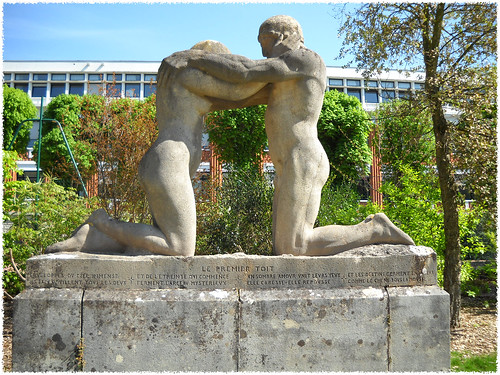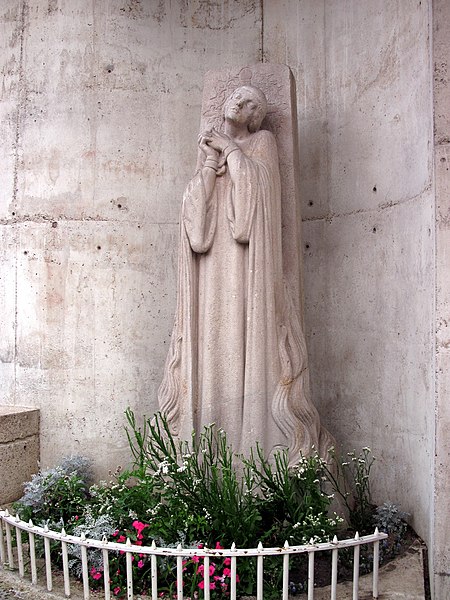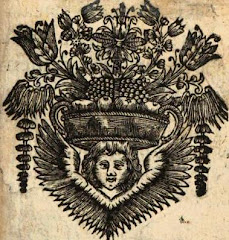Maxime: The Hand of Joan d' Arc
Early Life
 |
| Maxime at the age of 9 years old (Source 10) |
Maxime-Louis-Camille was the son of Désiré Louis RÉAL and Magdeleine-Blanche-Geneviève DELSARTE or del SARTE. He was born on May 2, 1888 in Paris, France.
His mother and father adopted the last name of "Réal del Sarte". Maxime's descendants are today known by that full last name.Through both his paternal and maternal side, Maxime was a relative of the French composer Georges Bizet. However, it was through his maternal side that he was a member of the House of Philippy de Bucelly d'Estrées being the great-grand-son of
Gabrielle de Philippy de Bucelly d'Estrées (1782-1854) who, was the daughter of Albert Philippy de Bucelly d'Estrées, baron d'Estrées, and his wife Anne-Catherine Georgia (1753). Maxime died on Feburary 15, 1954 at the age of 65.
As a child, Maxime had long blond hair (as we can see from the picture to the right). His mother, Madeleine painted an image of Maxime to celebrate his 9th birthday.
 |
| "Maxime" by Magdeleine Real del Sarte (Courtesy of O.R.S.) |
In 1908, he entered l’école des beaux-arts de Paris and by 1911 he was studying at the Académie Julian where his mother, Magdeleine Blanche Geneviève DelSarte, and aunt,
Thérèse Geraldy were teaching and practicing painting. It was there that he met two of his closest friends, Jacques Baron Meurgey de Tupigny (1891-1973), and Rogers de Villiers (1887-1958).
Military Service
Maxime, like his three other brothers (Ives, Serge, and André), served their country at the break of World War I (1914-1918). The sculptor was wounded on January 29, 1916 at Verdum and lost his left arm. For his courage he was awarded several medals. One of them being the
Croix de Guerre and later the
Légion d'honneur in the rank of Knight (Chevalier).
Early Works
With only one arm, Maxime continued to sculpt. When he returned home from the war, he finished one of his early projects, Le Premier Toit for which he received the Grand Prix national des Beaux-Arts in 1921
 |
| 1921 Le Premier Toit |
Another early work of Maxime was "Terre de France" (1919). Here Maxime introduces a modern allegory of France (the peasant mother, wife (now widow), and woman) who must continue on job that her dead solider left (Source 4). The sculpture "Terre de France" was first viewed at the "Salon des artistes" in 1919 (Source 1). Saint Jean de Luz was the first city that commissioned the statue for their city. It was inaugurated on September 20, 1920. The second statue was commissioned by the city of Sceaux and inaugurated on July 27, 1921 (see pictures below). Soon after, several other cities in the French Basque region acquired a monument from Maxime to honor their dead.
 |
| "La Terre de France" (1919) Saint Jean de Luz (Image Courtesy of F.M.R) |
 |
| "La Terre de France" (1919-1921) for the city of Sceaux |
 |
| Inauguration of July 27, 1921 of the monument "Terre de France" in Sceaux |
 |
Monument in Ascain, France (Pays Basque) by Maxime Real del Sarte (1921)
The models of this sculpture were Yves Réal-del-Sarte and Genevieve-Marie Renon (wife of Maxime) |
Religious and Political Convictions
To some, the name Maxime Réal del Sarte is synonymous with with such organizations as
L’Action française (1899),
Fédération nationale des Camelots du Roi (1908), and the Companions of Joan of Arc. This is not surprising considering that Maxime was first and foremost an ardent Catholic and a Monarchist. What all of this meant in France post World War I is difficult to access from our 21st century perspective. However, it suffices for the purpose of this blog, not so much to discus Maxime as a politician but describe the circles in which he moved in order to understand his intellectual and artistic aspirations.
 |
| The Arms of the Camelots du Roi |
The first organization which Maxime was active in was
L’Action française which was founded in 1899 and had a surge in followers after the first World War I. Perhaps the dissatisfaction with the French Republic prior and after the armed conflict with Germany and its allies contributed to its popularity.
L’Action française supported integral nationalism and opposed the growing socialist/communist wave in Europe. Many former officers and intellectuals belonged to the movement.
Maxime however, was responsible for being the co-founder of the
Les Camelos du roi. It was established on November 16, 1908 as a youth organization. The center for
Camelot activity during much of pre-World War II France was Paris' Latin Quater. There the youth of the King got involved in many brawls with left-wing groups. One important figure for members of this organization was Joan of Arc (1412-1431). They had an almost cult devotion to this saint. Maxime himself sculpted many figures of Joan of Art.
Perhaps the most celebrated of the Joan of Arc statues sculpted by Maxime, is the one located inches away from Rouen, the place were she was burnt alive.
 |
1928 Joan of Arc by Maxime Real del Sarte at Roen
|
The expression that Maxime gave to Joan of Arc has been described by some of his contemporaries as a religious experience. The Baron de Tupigny said about Maxime's relationship with Joan of Arc, "Il s’est battu
pour elle toute sa vie" [He fought for her all his life].
Maxime sought to establish Joan of Arc as the premier symbol of what it meant to be French. To this end, he formed part of another society in 1936: The Companions of Jeanne of Arc. This organization had as a mission to propagate the memory of the saint through mass patriotic and religious ceremonies. However, there was an important philosophical component to the the organizations which was provided by Charles MAURRAS (1868-1952) in such texts as "Méditation sur la politique de Jeanne d'Arc" (1929). This book was illustrated by Maxime.
During his lifetime, Maxime had strong connections with the monarchist or royalist movement in France. He was a friend of Louis Philippe Robert d’Orléans (1869-1926), Duc d’Orléans . Upon the death of Duc d’Orléans, Maxime sculpted the effigy on his tomb which today is located at the Royal Chapel of Saint Louis.
 |
| Photo Public Domain of the Duc d’Orléans by Maxime Real del Sarte |
 |
| The Tomb of the Duc d’Orléans by Maxime Real del Sarte |
 |
| His Royal Highness, The Duc d'Orleans |
Scholarship on Maxime Réal del Sarte (click to view)
Books:
-"Maxime Real del Sarte: Sa vie, son oeuvre" by Anne Andre GLANDY (Paris: Plon, 1955). Print
-"L'oeuvre de Maxime Real del Sarte" by Baron Jacques Meurgey de Tupigny and Anne Andre GLANDY (Paris:Plon, 1956)
Articles :
-"La 'jeanne Au Bûcher' De Maxime Réal Del Sarte (1927 - 1928): Sculpture Et Politique." by Agnès CALLU. Études
D'histoire De L'art Offertes À Jacques Thirion / Paris, École Des
Chartes. Éd. Par Alain Erlande-Brandenburg Et Jean-Michel Leniaud. (2001): 345-357. Print.
Photographs of Maxime Réal del Sarte
 |
Maxime and Marius Plateau, 1918 (Source 19)
|
 |
Maxime Real del Sarte, Photo by Henri Manuel,circa 1920 (Public Domain)
|
 |
Maxime Réal del Sarte, 1928 (Public Domain)
|
 |
Maxime During a War Memorial Presentation, 1932
|
War Memorials: Commemorating the Great War (1914-1918)
After World War I, Maxime began sculpting several of France's most important war memorials. He designed and sculpted over fifty memorials (Source 4). Perhaps it was his status as an amputated war veteran that made Maxime the preferred artist for this genre. Below are the images of some of his war monuments.
 |
| "Monument aux morts" (1919) in Sommieres-du-Clain |
 |
| Maréchal Joseph JOFFRE (1939) in Paris |
 |
The Artistic Signature
|
On many occasions, Maxime delivered his statues to the Army High Command with much ceremony. Below, the sculptor Maxime made a speech before the 23e Colonial regiment of Colonel Mollet while he delivered a model of his monument to général Charles Mangin (1866-1925). In 1940, Adolf Hitler ordered the destruction of Maxime's statue to General MANGIN, which was located at Place Denys-Cochin in Paris. The Germans resented MANGIN for ordering German woman during France's occupation of the Rhineland to service Senegalese troops (Source 2).
 |
| Maxime Real del Sarte is making a speech (1932) |
 |
| The Unveiling Ceremony of the Statue to General MANGIN (March 19, 1932) |
A Collaboration of Brothers
In 1920,
Dessins de guerre:
en collaboration avec ses frères (edited by E. de Boccard) was published. This book contained the drawings of Maxime, Serge, Yves, and André done while fighting at the front during World War I and in captivity.
The book also contains a piece of music written, while in captivity, by Yves Réal del Sarte entitled
"Chanson d'amour" and it is
dedicated to Sidney Veit.
The foreword was written by the politician Leon Daudet with a special dedication to the wife of Maxime Réal del Sarte. This album of pain, despair, and hope are an important testimony of human endurance during time of war.
 |
| (1920) |
Abbreviated list of the Work of Maxime Réal del Sarte
(by Category and Year)
Une liste abrégée des œuvres de Maxime Réal del Sarte
 |
L’Homme et son rêve, ca. 1930 (Public Domain)
|
Religious Sculpture/Sculpture religieuse
 |
| Saint Geneviéve (1916), Source 11 |
 |
| Inauguration of the statue to Saint Geneviéve 1934 - L'église de la Madeleine |
 |
| Maxime RdS with Saint Geneviéve (Source Getty images) |
 |
| Marie et l’Enfant Lausanne -1952 |
Jeanne d'Arc/Joan of Arc Small Sculptures
 |
| Jeanne d'Arc au Bouclier, Casquée, 1909,1916 in Bronze (Source 12) |

 |
Jeanne de Arc in Bronze, 1916 (Source 22)
|
Jeanne d'Arc/Joan of Arc Monumental Works
 |
Jeanne d'Arc (1944) à Nîmes (photo by D. Lenoir)
|
 |
Jeanne d'Arc, Cannes-France
|
 |
Jeanne d' Arc, Pau, France (Source 13)
|
 |
| Monument á Jeanne d'Arc ou l'Ange de la Paix, Poitiers-Face 1929 (Source 13) |
 |
Monument aux Morts et Jeanne d'Arc, Briey-France 1922 (Source 13)
|
 |
Monument á Jeanne d'Arc Arras-France, 1933 (Source 13)
|
 |
Monument á Jeanne d'Arc, Bayonne-France (Source 14)
|
 |
Saint Philippe du Roule ''Jeanne d'Arc'' (Source 15)
|
 |
| Jeanne of Arc from
Union française de Montréal (Source 16) |
 |
Jeanne au bûcher at the University of Montréal (Source 17)
|
 |
Jeanne d'Arc ( Vaucouleurs), Source 18
|
Busts of Jeanne d'Arc/Joan of Arc
 |
Reliquaire de Jeanne d'Arc, Domrémy-la-Pucelle, France (Source 13)
|
 |
Bust of Jeanne d'Arc in Bronze, c. 1920 (Source 19)
|
 |
Bust of Jeanne d'Arc in Terracotta (Source 20)
|
 |
Cast of Jeanne d'Arc (Source 23)
|
 |
| Jeanne d'Arc in Bronze (Source 25) |
 |
Head of Jeanne d'Arc (Source 26)
|
Busts of Women
 |
| Geneviéve BOUTS (née Real del Sarte), 1910 |
 |
| Bacchante ou Faunesse (1927) |
 |
| Bernadette GLANDY (née Huon de Kermadec), 1951 |
 |
La Faunesse in Marble (Source 20)
|
 |
Bust of a woman in Bronze, 1930 (Source 25)
|
Busts of Men
 |
| Professor Louis RENON by Maxime RdS - 1919 |
 |
Bust of Ernest Berger at Cimetière de Vaugirard
|
Women
Nude Women
 |
| L'Aube, ou la France a la Fleur -1922 |
 |
The Bather or La Baigneuse (Source 25)
|
 |
"Nu féminin" in marble (Source 26)
|
 |
"Ivresse" in Bronze (Source 27
|
 |
"Seated Nymph" in Terracotta (Source 25)
|
 |
"Repos Épreuve" (Source 25)
|
 |
"Femme avec son chat"
|
War/Military Memorials:
 |
Monument aux morts de Rouen (Public Domain)
|
 |
The soldiers at the base of the monument (Public Domain)
|
 |
"La Victoire de Droit " - La Grand-Comb, 1922 (Source 8)
|
Note: The monument "La Victoire de Droit" was sculpted by Maxime Réal del Sarte and Roger de Villiers, (1887 -1958)
 |
"Je t'ai cherché" Ressons-sur-Matz, 1924 (Source 8)
|
 |
| "Je t'ai cherché.." Sare, France - 1920 |
 |
| Monument aux Morts Eparges, France - 1935 |
 |
| Destruction of Monument |
 |
Restoration of the Monument (Source 28)
|
 |
Le monument des Marie-Louise (1927)
|
Sculptures in Honor of Royalty
 |
| Médaillon of Louis le grand, Saint-Jean-de-Luz, France |
 |
| Monument to Alexander I of Yugoslavia Paris, France |
 |
| Médaillon of Queen Astrid of Belgium - 1936 |
 |
| Queen Victoria of the United Kingdom Médaillon - 1939 |
 |
| Monument au Duc Decazes (1951) |

Updated 2/1/2023
__________________________________________________________
Sources Consulted
1) "L' ouvre du sculpteur REAL del SARTE" by Frédérique MARTY REAL del SARTE (published in "Atlantica" July/August 2005)
2) http://www.vanderkrogt.net/ entry for "War Statues" and "Real del Sarte" The following images were used from this website: "Jon of Arc", "Monuments aux morts", and "Marshal Joffre"
3) Wikipedia entry for "General Charles MANGIN"
4) Stamps-Auction.com entry "Terre de France" Image
5) "Construction of Memory in Interwar France" by Daniel SHERMAN (2001) p.43 on "Google Books"
6) Gallica.bnf/.fr "Maxime Real del Sarte" entry. The following images were taken: "1932 Maxime Making a Speech"
7) "Dessins de guerre: en collaboration avec ses frères" (1920). Courtesy of Google Books and Princeton University.
8) www.monumentssauxmorts.fr entry "Maxime Real del Sarte". Image taken from this was
"La Terre de France" in the city of Sceaux
9) "Méditation sur la politique de Jeanne d'Arc" by Charles MAURRAS (1929)
10) "Maxime Real del Sarte: Sa vie, son oeuvre" by Anne Andre GLANDY (1955)
11) Saint Geneviéve (1916) was the first work of Maxime Réal del Sarte after his amputation. It was first inaugurated in 1934. Translated note from the book "Maxime Real del Sarte: Sa vie, son oeuvre" by Anne Andre GLANDY (1955).
12) One of the first images of Jean de Arc created by Maxime RdS. The "Jeanne d'Arc au Bouclier" was done at the prison de la Santé in 1909. Other versions were ordered for the Church of Saint-Martin de Roubaix. Versions of this image exist in Bronze and Bronze with gold patina from 1916. Translated note from the book "Maxime Real del Sarte: Sa vie, son oeuvre" by Anne Andre GLANDY (1955).
13) The images were taken from the website "E-Monumen" (https://e-monumen.net/patrimoine-monumental/statue-jeanne-darc-pau/).
14) Picture of statue taken from Twitter account (https://twitter.com/AdrienMolin/status/1266688100740272131/photo/2).
15) Picture of Jeanne d'Arc in armor was taken from the website "Geneawiki" (https://fr.geneawiki.com/index.php/Paris_-_%C3%89glise_Saint-Philippe-du-Roule).
16) Picture of Jeanne d'Arc from the the Union française de Montréal was taken from the website "Waymarking" (https://www.waymarking.com/waymarks/WMZRAC_Jeanne_DArc_Joan_of_Arc_Montral_Qubec).
17) The image of "Jeanne au bûcher" (1928) at the University of Montréal was taken from the website, "commons.wikimedia" (https://commons.wikimedia.org/wiki/Statues_of_Jeanne_d%27Arc).
18) This image was taken from the website St.Joan-Center (http://www.stjoan-center.com/meuse/meuse5.html). According to the author of the webpage, "his [Maxime's] statue of Saint Joan, entitled Jeanne d'Arc was commissioned
by the US Congress at the close of W.W.II. It was originally destined
for the 'Congressional Hall of Heroes,' which is located
in the basement of the congressional building, but when it came time to
pay the
sculptor, Maxime Real del Sarte, Congress refused to pay. It was
purchased
instead by the Department of the Meuse and was placed in the upper
church of
the Vaucouleurs castle, where it remains to this day. The upper church
is
closed to the general public but with special permission from the city
it may be viewed".
19) Bust of Jeanne d'Arc in bronze was taken from the website "Liveauctioneers"(https://www.liveauctioneers.com/item/9275920_66491-rare-maxime-real-del-sarte-silvered-bronze-jea). This piece was sold in 2011 for 2,000US.
20) Marble bust image was taken from from the website "Liveauctioneers"(https://www.liveauctioneers.com). It was sold in 2018 for 1,000US.
21) Bust of Jeanne d'Arc in Terracotta was taken from website "Liveauctioneers"(https://www.liveauctioneers.com). Front and back images. The back has an inscription that is illegible.
22) Small statue of Jeanne d'Arc in bronze and nickle. Photo taken from website "Liveauctioneers"(https://www.liveauctioneers.com). The statue sold in 2019 for 340US.
23) The maquette or cast of Jeanne d'Arc belongs to Madame F. M-R.d S. and the picture was taken by her in 2018.
24) The image of the bronze bust of a woman was taken from the website "1930.fr" (https://1930.fr/maxime-real-del-sarte-bronze-bust.html)
25) The image of the bust of Jeanne d' Arc in bronze and the image of the "The Bather" was taken from the website "Invaluable" (https://www.invaluable.com/auction-lot/maxime-real-del-sarte-1888-1954-buste-en-bronze-c-157-c-b0edf618ea)
26) The image of the head of Jeanne d'Arc was taken from the website, "Millon and Associates" (https://www.millon.com/recherche?query=Real+del+Sarte&btOk=)
27) The image of the the nude woman was taken from the website "Incollect" (https://www.incollect.com/listings/decorative-arts/garden-architectural/maxime-real-del-sarte-20th-c-bronze-statue-ivresse-by-maxime-real-del-sarte-292331)
28) Photo of reconstruction of monument was taken from "France Estimations" (https://france-estimations.fr/maxime-real-del-sarte-tete-de-faunesse-bronze/)
29) The image of Maxime in 1919 was taken from the website "Camelotsduroi"(http://camelotsduroi.canalblog.com/archives/2006/06/01/2003646.html)
30) The image was taken from the website (https://www.antiquites-en-france.com)
































































































